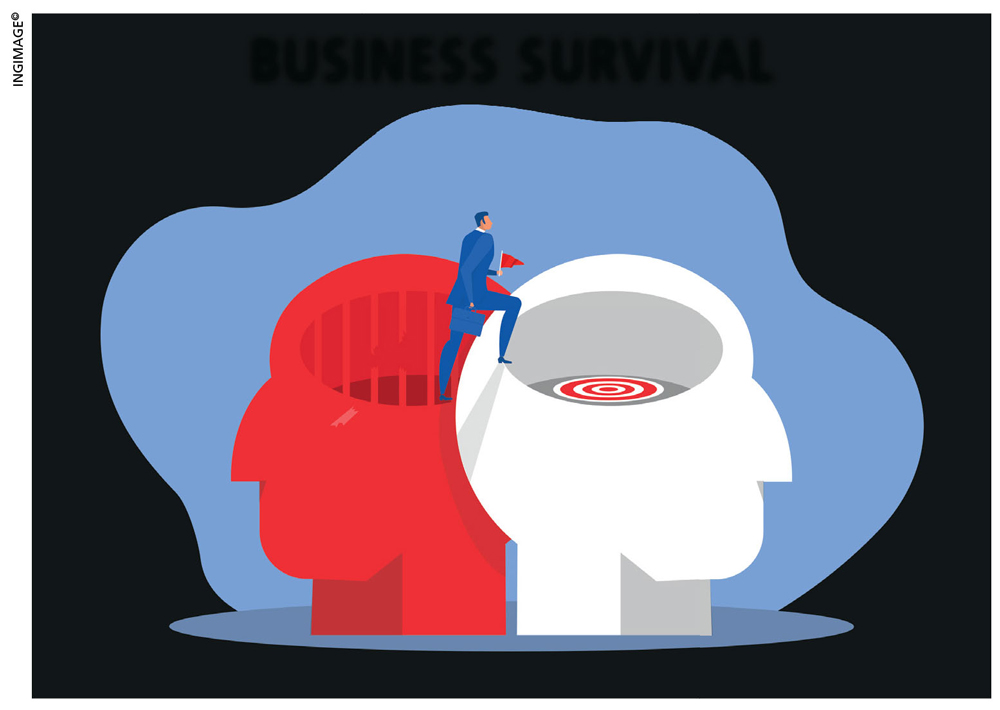BUSINESS SURVIVAL
COMFORT IS A SILENT ASSASSIN!
Fazmina Imamudeen explores the dangers of remaining in one’s comfort zone

In the world of business – where every decision carries weight and each move is scrutinised – there’s a phenomenon that often goes unnoticed: the insidious grip of the comfort zone.
It is a subtle force that lures individuals and organisations into a false sense of security, trapping them in the confines of the known. But in the evolving landscape where innovation is the currency of success, breaking free of the comfort zone isn’t simply an option; it’s a necessity.
Countless narratives of success in entrepreneurship, leadership and creativity stem from individuals daring to challenge this invisible yet potent constraint, which inevitably inhibits growth.
At its core, the comfort zone represents a psychological state where individuals feel safe, secure and in control. It’s the territory of routine, predictability and low risk. But it’s also the breeding ground for stagnation.
Be it personal or professional, growth requires challenges, risks and discomfort. By remaining within the confines of comfort, people deprive themselves of the experiences and opportunities that are critical for advancement.
Businesses also fall prey to the appeal of the comfort zone. Established routines, familiar strategies and proven methodologies can lead to complacency within organisations.
While stability is vital for sustainability, it’s the willingness to venture beyond the known that distinguishes thriving enterprises from those that merely survive. Innovation, adaptability and resilience flourish in environments where the status quo is continually challenged.
Embracing discomfort isn’t synonymous with reckless abandon; it’s about calculated risk taking and deliberate action.
Whether it’s launching a new product, entering untapped markets or adopting disruptive technologies, progress often necessitates venturing into uncharted territory. And the discomfort that accompanies such endeavours serves as a catalyst for learning, growth and ultimately, success.
The COVID-19 pandemic serves as a reminder of how external forces can disrupt our comfort zones – and compel us to adapt and innovate rapidly. When the novel coronavirus struck, individuals, businesses and entire industries were forced to confront unprecedented challenges, and navigate uncharted territory.
Consider the shift to remote work as a prime example. For many professionals accustomed to the structure and familiarity of office environments, transitioning to remote work was a significant departure from their comfort zones.
Suddenly, people had to adapt to new technologies, navigate virtual communication channels and find ways to maintain productivity amid the distractions of domestic life.
As industries undergo seismic shifts and technological advancements reshape the business landscape, the comfort zone becomes an increasingly perilous refuge.
Forward-thinking organisations recognise the imperative of embracing discomfort. By challenging the status quo and venturing into uncharted territory, businesses position themselves as pioneers in an era of unprecedented change.
Leadership in particular demands a departure from the comfort zone. Great leaders understand that growth is not confined to individual accomplishments but extends to the collective capacity of their teams. By encouraging calculated risk taking, fostering a culture of innovation and leading by example, they empower their organisations to transcend limitations and reach new heights.
Psychological research corroborates the notion that growth occurs outside comfort zones. The Yerkes-Dodson law posits that performance increases with physiological or mental arousal… up to a point.
Beyond this optimal level of stimulation lies the zone of discomfort where anxiety and uncertainty may prevail. Yet, it’s within this zone that peak performance and transformative growth are attained.
Overcoming the inertia of the comfort zone requires a shift in perspective and deliberate action. Setting audacious goals, seeking new experiences and cultivating resilience form the basis of this journey.
Moreover, embracing failure as a catalyst for learning and viewing discomfort as a sign of progress fosters a growth-oriented mindset that’s essential for success.




